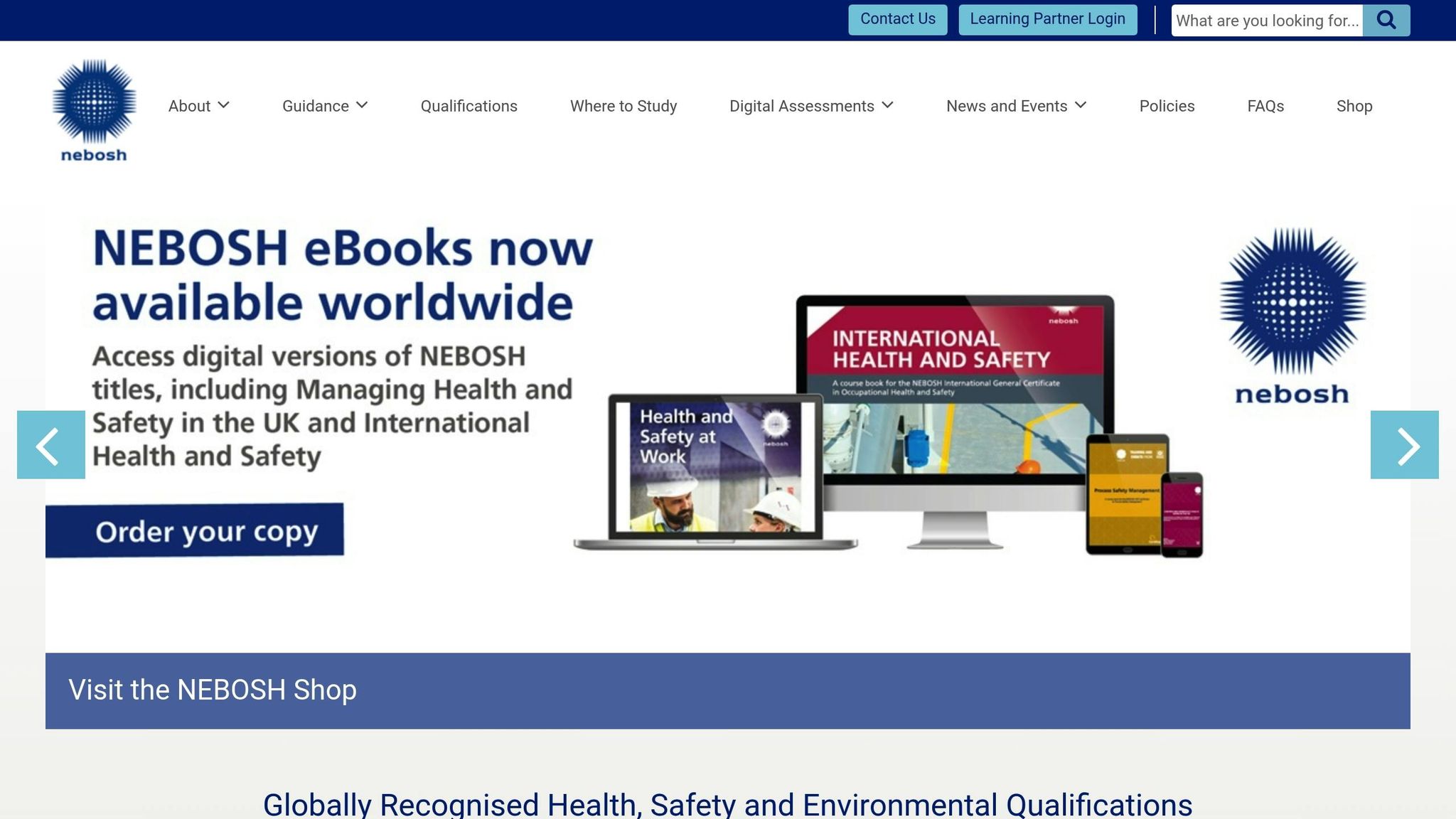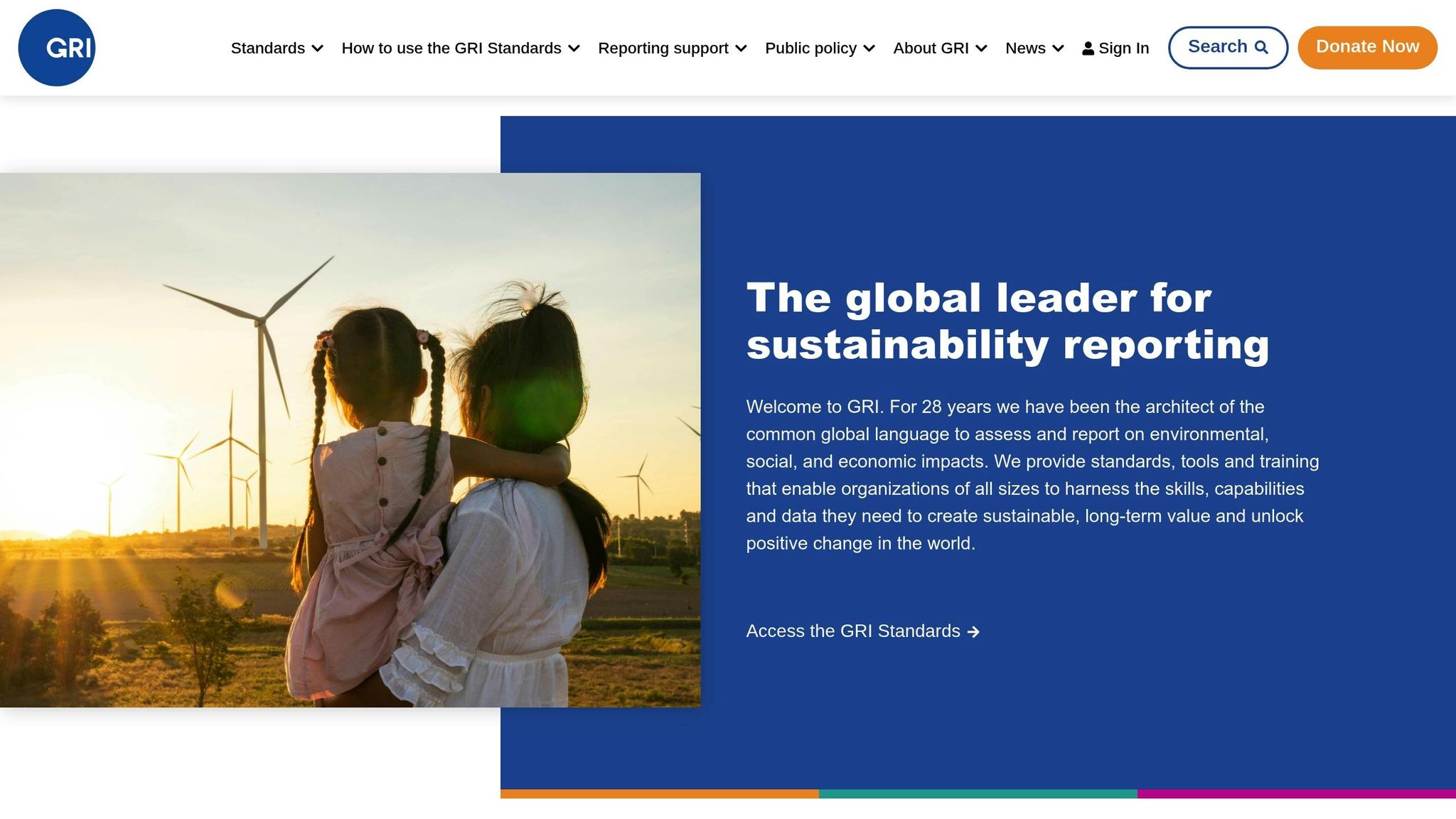Sustainability certifications are increasingly shaping careers in the U.S. job market, where demand for green professionals is skyrocketing. Here's why these credentials matter:
- Job Growth: Over 10 million sustainability job openings in 2025, growing 30% faster than other roles.
- Higher Pay: Certified professionals earn 15–25% more than their uncertified peers.
- ESG Demand: By 2026, ESG investments will reach $33.9 trillion, pushing companies to prioritize sustainability expertise.
- Future Opportunities: Up to 24 million new sustainability roles are expected by 2030, spanning renewable energy, ESG reporting, and finance.
Certifications like CSE, CSP, LEED AP, CEM, and GRI provide specialized skills, making professionals more competitive. They offer pathways into leadership roles, salary increases, and access to industries prioritizing sustainability. Tools like JobSwift.AI can further streamline job searches and maximize career potential.
Quick Takeaway: Investing in a sustainability certification not only boosts your earning potential but also positions you for long-term career growth in a rapidly growing sector.
Top 3 Environmental Certifications to Boost Your Green Career 🌱 | NEBOSH, IEMA, OTHM #environmental

1. Certified Sustainability Practitioner (CSE)
The Certified Sustainability Practitioner (CSE) certification has been a trusted credential in the field of sustainability since 2005. Over the years, it has certified more than 4,000 professionals, including C-Suite executives from Fortune 500 companies.
Core Competencies
The CSE program is designed to equip professionals with the tools and knowledge necessary to implement corporate sustainability strategies and improve ESG ratings. The certification is structured around six key modules:
| Key Modules | Description |
|---|---|
| Sustainability Concepts | Covers the fundamentals of sustainability, including definitions and the business case for adopting sustainable practices. |
| Local Legislation and Regulations | Focuses on major regulations like the SEC's climate-related risk disclosure rule, Canadian Sustainability Standards Board (CSSB) reporting, and the Corporate Sustainability Reporting Directive (CSRD). |
| Strategy Integration | Explores how to engage stakeholders and create strategies that embed sustainability into business operations. |
| Sustainability Reporting | Guides participants through creating sustainability reports, conducting materiality assessments, and utilizing standards like GRI, SASB, TCFD, ISSB, and ESRS. |
| Responsible Communication | Teaches green marketing, avoiding pitfalls like "greenwashing", and aligning communications with SDG goals. |
| Circular Economy | Includes case studies and practical applications in supply chain sustainability, carbon management, and achieving Net Zero targets. |
These modules address pressing market needs and regulatory challenges, offering participants actionable insights and tools to set carbon reduction goals and develop sustainability strategies. The program also provides sector-specific training, including online courses tailored for the Energy & Energy Utilities Sector.
Prerequisites and Eligibility
The CSE certification is open to professionals at any career stage. There are no academic prerequisites for entry-level programs, making it an ideal choice for those transitioning into sustainability roles. The program welcomes a wide range of professionals, including Sustainability/ESG Directors, CFOs, Corporate Affairs experts, HR leaders, and individuals working in finance, procurement, and NGOs.
Three pathways are available:
- Basic Edition: Open to all professionals with no prerequisites, requiring only a computer and a Zoom account.
- Advanced Edition: Suitable for specialists from various business functions.
- Leadership Edition: Tailored for corporate decision-makers and C-level executives.
Industry Recognition
CSE is widely recognized as a leader in sustainability training, offering certifications and specialized ESG services to professionals and organizations worldwide. Its global reach spans 90 countries, with certified practitioners working across diverse industries.
"Companies integrating ESG into financial strategies are better positioned for long-term performance, as investors increasingly factor sustainability into valuation models." - Nikos Avlonas, President of CSE
Impact on Salary and Career Advancement
Earning a CSE certification can significantly enhance career opportunities. The ESG consulting and training industry is valued at over $36 billion, creating abundant opportunities for certified professionals. Organizations are willing to invest in sustainability experts who can navigate complex regulations and meet stakeholder expectations.
The certification’s focus on regulatory compliance, including the SEC’s climate-related risk disclosure rule and international reporting standards, makes CSE holders particularly attractive to employers. This expertise, combined with practical skills in strategy development and stakeholder engagement, positions certified professionals for career growth.
For those looking to maximize the impact of their CSE certification during job searches, tools like JobSwift.AI can assist by tracking applications and offering AI-driven insights into employer preferences. This combination of robust training and career support underscores the certification’s value, setting the stage for a detailed comparison of sustainability certifications in the next section.
2. Certified Sustainability Professional
The Certified Sustainability Professional (CSP) certification is a key credential for those aiming to advance in sustainability-focused careers. This program validates expertise in sustainability leadership, strategic planning, and implementation across various industries. Unlike certifications tailored to specific sectors, the CSP offers a broad foundation, equipping professionals with the skills needed to address today’s complex sustainability challenges.
Core Competencies
The CSP certification prepares professionals to seamlessly integrate sustainability into business operations. It focuses on leadership, strategic planning, and executing sustainability initiatives effectively. The program aligns with internationally recognized standards like ISO 17024 and is built around the GPM Sustainability Competence Standard. This ensures that certified professionals excel in areas such as ESG compliance, business strategy alignment, and stakeholder engagement.
Prerequisites and Eligibility
Several organizations offer the CSP certification, each with unique pathways to eligibility:
- American Institute of Business and Management (AIBM): Requires candidates to have a bachelor’s degree from a recognized institution or 2–5 years of relevant work experience. This allows individuals without a degree to qualify based on their professional background.
- Global Skill Development Council (GSDC): Focuses on professionals with sustainability experience. Pricing is flexible, with a single certification module costing $300 (discounted from $600) or a bundle of three certifications available for $600 (discounted from $1,200).
- International Society of Sustainability Professionals (ISSP): Offers a tiered approach, starting with the Sustainability Excellence Associate (SEA) credential, which can lead to the more advanced Sustainability Excellence Professional (SEP) certification.
Industry Recognition
The CSP certification is widely acknowledged across industries such as finance, manufacturing, technology, healthcare, and government. As organizations increasingly prioritize sustainability, professionals with this credential are sought after for roles not only in environmental management but also in areas like finance, human resources, supply chain, and corporate governance.
Impact on Salary and Career Advancement
Data from 2024 GreenBiz highlights the financial and career benefits of CSP certification. Certified professionals earn 10–30% more than their peers, with U.S. sustainability managers averaging $159,430 annually, directors earning $244,649, and vice presidents reaching $471,933. Additionally, the credential often accelerates career progression into leadership roles. The CSP assessment costs $1,499, with flexible monthly payment plans available.
To further enhance career opportunities, platforms like JobSwift.AI provide tools to track job applications and leverage AI-driven employer insights. These resources add value to the CSP credential, making it a strong choice for professionals aiming to thrive in sustainability-focused roles.
3. LEED Accredited Professional
The LEED Accredited Professional (LEED AP) certification is one of the most recognized credentials in the green building industry. With over 203,000 professionals holding a LEED credential, it represents advanced expertise in sustainable building practices and LEED standards. This certification blends technical knowledge with market demands, making it an essential qualification for those aiming to excel in green building.
Core Competencies
The LEED AP with Specialty certification goes beyond basic understanding, offering in-depth knowledge in areas like transportation planning, energy efficiency, water management, and indoor air quality. While the LEED Green Associate credential provides a general overview, the LEED AP focuses on specialized building categories, showcasing a higher level of expertise.
This certification equips professionals to guide projects through the entire LEED certification process. From handling complex metrics to managing multidisciplinary teams and adhering to rigorous green building standards, LEED APs play a pivotal role. This technical proficiency often leads to higher salaries and leadership positions in project management.
Prerequisites and Eligibility
To pursue the LEED AP certification, candidates must meet a few key requirements, including being at least 18 years old. While not mandatory, practical project experience is highly recommended.
Candidates can choose from five specialization areas to align the certification with their career goals: Building Design + Construction (BD+C), Operations + Maintenance (O+M), Interior Design + Construction (ID+C), Neighborhood Development (ND), or Homes. This flexibility allows professionals to tailor their expertise to specific sectors.
Exam costs vary based on membership with the U.S. Green Building Council (USGBC). For non-members, the combined LEED Green Associate and LEED AP with Specialty exam costs $550, while members pay $400. Those who already hold the Green Associate credential can take the specialty-only exam for $350 ($250 for members).
To maintain the credential, LEED APs must complete 30 continuing education hours within two years, which is twice the requirement for Green Associate holders.
Industry Recognition
LEED AP certification is highly regarded in the construction and architecture industries, both in the U.S. and internationally. It is a recognized marker of expertise in sustainable building practices. Vessela Valtcheva-McGee, Architect and Managing Partner of Triple Green Building Group, highlights its global appeal:
"LEED has a really good market uptake both in the US and internationally. So to have a LEED AP credential is definitely a plus for people looking to do work in emerging markets like China, India, and the Middle East, as well as here in the US."
Impact on Salary and Career Advancement
The technical knowledge that comes with a LEED AP certification not only boosts project outcomes but also translates into tangible financial benefits. As of July 2025, LEED Accredited Professionals in the United States earn an average base salary of $97,000, according to PayScale.com. LEED professionals earn a median salary of $66,800, notably higher than the $59,800 median for non-LEED professionals.
On average, LEED-certified individuals see a 12% salary increase, with architects specifically enjoying pay raises between 5% and 10% compared to their non-certified peers.
The credential also opens doors to senior roles in project management and architecture. For example, Senior Project Managers in Construction earn an average of $129,657, while Senior Project Architects bring in $110,461.
To maximize career opportunities, leveraging tools like JobSwift.AI for job insights and application tracking can be a game-changer. Combining the LEED AP certification with a strategic job search approach positions professionals for success in the expanding green building sector.
4. Certified Energy Manager (CEM)
The Certified Energy Manager (CEM) credential is a globally recognized certification that demonstrates expertise in improving energy efficiency across facilities and industrial plants. Since its launch in 1981, the program has certified over 40,000 professionals in more than 100 countries.
"The Certified Energy Manager (CEM) is the industry's most respected certification, empowering professionals like you to cost-effectively progress on sustainability goals, and help organizations become more cost competitive." – AEE Center
This certification equips professionals with the skills to drive both environmental and financial improvements by showcasing their proven abilities in energy management.
Core Competencies
CEM certification provides a solid foundation in integrating electrical, mechanical, process, and building infrastructure systems. It emphasizes identifying cost-efficient methods to lower energy use. The program covers 14 key areas, including energy auditing, building automation, renewable energy systems, HVAC, and emerging technologies like AI-powered controls. With this knowledge, CEM professionals are well-prepared to lead teams and implement impactful energy strategies.
Prerequisites and Eligibility
The CEM certification offers multiple pathways to accommodate candidates with varying backgrounds in education and experience. Common eligibility criteria include:
- A 4-year engineering or architectural degree (or equivalent, such as a Professional Engineer or Registered Architect) and 3+ years of relevant experience.
- A 4-year degree in technology, environmental science, physics, or earth science with 4+ years of experience.
- A business degree paired with 5+ years of related experience.
- A 2-year associate degree in energy management and 6+ years of experience.
- At least 10 years of related experience without a degree.
Candidates must also complete an approved training program as part of the certification process. For those who haven't yet met the experience requirements, the Energy Manager In-Training (EMIT) certification serves as a stepping stone. This provisional credential is valid for six years, allowing candidates to work toward full certification. The program is accredited by the ANSI National Accreditation Board (ANAB), ensuring it adheres to rigorous professional standards.
Industry Recognition
The CEM credential is internationally respected, signifying advanced expertise, experience, and ethical standards in energy management. Its comprehensive curriculum and ongoing education requirements help professionals stay current with industry trends and new technologies. This makes it particularly appealing for those working with global corporations or seeking international career opportunities [42, 47]. The certification’s prestige often translates into better job prospects and salary growth.
Impact on Salary and Career Advancement
Earning a CEM certification can lead to substantial financial and career benefits. As of July 2025, the average annual salary for a CEM in the United States is approximately $160,216. PayScale reports a more modest average of around $101,000 per year, while data from AEE indicates that certified energy professionals typically earn between $100,000 and $150,000 annually. Additionally, 56% of certified professionals received merit bonuses in 2019 [45, 46].
The certification opens doors to a variety of high-paying roles in the energy sector. Below are some examples:
| Job Title | Salary Range | Average |
|---|---|---|
| Energy Manager | $64,000 – $136,000 | $100,208 |
| Senior Mechanical Engineer | $75,000 – $156,000 | $114,994 |
| Senior Consultant, Energy | $93,000 – $174,000 | $111,500 |
| Project Manager | $73,000 – $140,000 | $99,768 |
| Energy Engineer | $73,000 – $133,000 | $90,533 |
Beyond salary, the CEM credential enhances credibility and opens up leadership opportunities in energy management. For those looking to maximize their career potential, tools like JobSwift.AI can provide insights into energy sector job markets and streamline the application process.
sbb-itb-96bfd48
5. Global Reporting Initiative (GRI) Certification

The Global Reporting Initiative (GRI) Certification, established in 1997, sets a worldwide standard for organizations to report their environmental, social, and economic impacts. This certification equips professionals with the skills to implement GRI Standards effectively, improving the quality and consistency of sustainability reporting across various industries.
"The GRI Professional Certification Program is designed to enhance the knowledge, experience and skills of sustainability professionals in the implementation of the GRI Standards to improve the quality of sustainability reports." – GRI
Currently, 73% of the 250 largest companies globally rely on GRI Standards to guide their sustainability reporting. This makes the certification a valuable credential for professionals in environmental, social, and governance (ESG) roles, as well as broader sustainability-focused careers.
Core Competencies
The GRI Certification program focuses on building practical skills that meet the growing demand for sustainability expertise. It trains professionals to apply GRI Standards effectively, covering key areas such as materiality assessments, sector-specific disclosures, and impact materiality. These skills ensure that sustainability reports not only reflect an organization’s true environmental and social impacts but also align with global standards, such as the UN Sustainable Development Goals and the OECD Guidelines.
The certification also introduces GRI’s three-tier reporting system - Core, Comprehensive, and Sector Disclosures. This flexible structure allows professionals to customize reports based on their organization’s specific needs and stakeholder expectations, ensuring the disclosures are both relevant and meaningful.
Prerequisites and Eligibility
The GRI Professional Certification Program is open to sustainability professionals at all career stages. While there are no strict academic requirements, it is particularly suited for those working in sustainability, ESG reporting, or corporate responsibility. The program provides in-depth training on the GRI Standards framework, sustainability concepts, and practical implementation strategies. This principle-based approach ensures that professionals can deliver tailored yet globally aligned reports.
Industry Recognition
GRI certification is widely respected across industries, thanks to the global prominence of the framework. Over 10,000 companies in more than 100 countries use GRI Standards, and in 2022, 78% of the world’s 250 largest companies published GRI-compliant reports. This recognition has made GRI expertise a highly sought-after qualification, frequently appearing in job descriptions for sustainability and ESG-related roles.
Impact on Salary and Career Advancement
Earning a GRI certification can significantly boost career opportunities and earning potential in the sustainability field. As companies face growing pressure from investors, regulators, and stakeholders to deliver transparent sustainability reports, professionals with GRI expertise are increasingly in demand. Many job postings for sustainability and ESG positions explicitly list GRI certification as a preferred or required qualification, giving certified professionals a competitive advantage.
Similar certifications have shown to increase median salaries by over $27,000 annually. With more companies adopting standardized frameworks like GRI, professionals with this targeted expertise are well-positioned to take on leadership roles in sustainability reporting, ESG strategy, and corporate responsibility.
For those looking to explore career opportunities in this expanding sector, tools like JobSwift.AI can provide valuable insights into the sustainability job market and help streamline applications for roles that prioritize GRI expertise.
Certification Comparison: Benefits and Drawbacks
After exploring individual certifications, it’s time to weigh their benefits and drawbacks to decide which one suits your goals best. Factors like cost, preparation time, prerequisites, and career impact can help guide your choice.
Certification costs differ widely. For instance, earning LEED credentials often involves a higher financial commitment due to exam fees, study materials, and renewal costs. In contrast, certifications like the Certified Energy Manager (CEM) or Global Reporting Initiative (GRI) certification tend to have more manageable fee structures. It’s essential to consider not only the upfront costs but also the ongoing expenses of maintaining your certification. For example, USGBC membership offers discounted LEED exam fees, which can help offset some of the costs.
Certifications like CEM, GRI, CSE, and CSP are often more budget-friendly while still offering solid opportunities for career advancement.
Preparation time varies significantly. The LEED Green Associate typically requires around 48 hours of study, while certifications like CEM and GRI demand anywhere from 40 to 80 hours. On the other hand, the Certified Sustainability Professional certification may require over 100 hours of coursework and preparation.
Prerequisites also differ between certifications. The LEED Green Associate, for example, is accessible even to recent graduates, making it an appealing choice for those transitioning into sustainability careers. In contrast, CEM certification requires relevant work experience in energy management. Similarly, while GRI certification is open to professionals at all levels, it’s particularly advantageous for individuals already working in ESG or sustainability-related roles.
Career impact is perhaps the most important factor to consider. In industries like construction and real estate, LEED credentials are highly respected. For example, 23% of sustainability professionals in these fields hold LEED certifications, with 20% achieving advanced LEED status. Meanwhile, 46% of sustainability professionals have been trained in the GRI framework, and over half of directors and VPs in the field have completed GRI programs. Additionally, demand for green-skilled professionals is on the rise - growing 11.6% year-over-year - with many roles offering a hiring premium of over 50%. The demand for ESG Compliance Officers has also surged, with a 35% increase in hiring over the past year.
It’s worth noting that ongoing education and renewal requirements can add to the time and cost commitments of maintaining certifications. Evaluating these factors can help you determine how to align your certification choice with your career aspirations.
For those looking to maximize their investment, platforms like JobSwift.AI provide market insights to help identify the most impactful certifications for your goals.
Ultimately, the right certification depends on your career objectives, industry focus, and available resources. If you’re seeking a quick entry into sustainability roles, options like the LEED Green Associate or GRI certification might be ideal. However, for professionals targeting specialized technical positions, pursuing certifications such as CEM or advanced LEED credentials might be worth the higher investment.
Using AI Tools to Advance Your Certified Career
Earning sustainability certifications is just the beginning; the real challenge lies in leveraging them to propel your career forward. This is where AI-powered platforms come into play, offering tools that can make a noticeable difference in your professional journey.
AI tools can analyze your certifications to identify roles that fit perfectly with your qualifications. For instance, if you're a project manager with LEED credentials, AI-driven job matching tools can recommend green building projects that align with your expertise. This precision is especially valuable in the niche field of sustainability, where certifications like CEM, GRI, or CSP are highly specialized. By narrowing down roles that truly value your skills, these tools save you time and connect you with employers who recognize your expertise.
AI also provides detailed salary insights and career opportunities for certified professionals. With data on regional salary trends and certification-specific premiums, you can better strategize your job search. For example, sustainability professionals often earn 10–30% more than their non-certified peers. AI platforms can help you pinpoint which certifications or skill combinations are most sought after in your target market, ensuring you maximize your earning potential.
Skill gap analysis becomes more precise with the help of AI. These platforms compare your current credentials against industry standards and job market demands, offering recommendations for additional certifications or training. For instance, a software developer aiming to transition into sustainable technology could use AI insights to determine which environmental certifications would best complement their technical expertise.
AI tools also optimize your resume and cover letter for specific job descriptions, a crucial advantage in sustainability roles. Platforms like JobSwift.AI provide features such as AI-driven employer insights and CV optimization tools. Their job application dashboards allow you to track your progress while offering valuable market intelligence on which sustainability credentials are most in demand. By tailoring your application materials to highlight your certifications, these tools help you stand out in a competitive field.
Combining AI with sustainability opens doors to unique career paths. Companies that use advanced digital tools for emissions tracking are twice as likely to meet their reduction goals, and nearly half of executives see AI as essential for improving reporting and performance. With AI-related job openings growing by 32% year-over-year and median salaries reaching $160,056, professionals who can integrate AI with sustainability expertise are especially well-positioned for career growth.
AI platforms can also provide personalized career advice by analyzing your credentials and goals. Whether you're exploring new certifications or considering a shift to a different industry, these insights can guide you toward informed, data-driven decisions. By combining AI-driven recommendations with your existing certifications, you create a streamlined path to career advancement.
In a competitive job market, platforms that understand the value of sustainability certifications - and can effectively communicate that value to employers - offer certified professionals a significant edge. By strategically using AI tools, you can unlock new opportunities and take your career to the next level.
Conclusion
Sustainability certifications are proving to be a game-changer for career growth in the U.S. energy sector. Certified professionals not only command salaries that are 10–30% higher than their non-certified counterparts, but they are also stepping into roles that are expanding at an impressive rate of 8% annually. These trends highlight the growing importance and value of earning these credentials.
The numbers speak for themselves: over 70% of sustainability professionals now hold advanced degrees or certifications, a clear indicator of the industry's focus on expertise and qualifications. This emphasis is mirrored across key industries like finance, energy, manufacturing, and technology, where sustainability practices are being adopted at a rapid pace. And with more than 70% of consumers willing to pay extra for sustainably produced goods, companies are actively seeking professionals who can help them adapt to these shifting priorities.
For those considering certification, the key lies in aligning your choice with your career ambitions. Whether you're aiming for expertise in energy management, green building, or sustainability reporting, the right certification can open doors to faster promotions, broader job opportunities, and higher pay. Tools like JobSwift.AI can simplify the process, connecting you with employers who prioritize sustainability expertise.
With rising demand, salary advantages, and opportunities for career advancement, earning a sustainability certification is a smart move for professionals in the energy sector. By choosing credentials that match market needs and leveraging tools like JobSwift.AI, you position yourself as a leader in the industry's transformation. As sustainability and ESG reporting take center stage in boardrooms, certified professionals are poised to drive meaningful change and shape the future of the energy sector.
FAQs
How do CSE and CSP sustainability certifications compare in terms of career benefits and industry recognition?
The Certified Sustainability Practitioner (CSE) certification is recognized globally and holds a strong reputation for its industry credibility. It's widely trusted by leading professionals and organizations, making it a powerful credential for advancing your career.
Similarly, the Certified Sustainability Professional (CSP) certification is well-regarded, focusing on building expertise and adaptability in sustainability practices. While both certifications offer valuable benefits, the CSE tends to have broader recognition and can open more doors for career growth, particularly in the United States and international markets.
What should I consider when selecting a sustainability certification to advance my career?
When selecting a sustainability certification, it's crucial to prioritize how well it aligns with your career aspirations and the standing it has within your industry. The credibility of the certifying organization is equally important, as it can influence how employers evaluate your qualifications.
Think about whether the certification is tied to key sustainability areas relevant to your field, such as renewable energy, environmental management, or corporate social responsibility. Choosing the right certification can deepen your knowledge, open up new job opportunities, and even boost your earning potential.
How can AI platforms like JobSwift.AI simplify the job search for sustainability professionals with certifications?
AI platforms like JobSwift.AI simplify the job hunt for certified sustainability professionals, offering tools designed to make the process smoother and more focused. Features like personalized job matching, automatic tracking of applications, and in-depth employer insights allow users to zero in on opportunities that truly align with their expertise.
By using JobSwift.AI, professionals can save valuable time, keep their job search organized, and create tailored applications that catch the eye in a competitive field. Its AI-powered tools help make career growth more manageable and targeted for those looking to advance.


